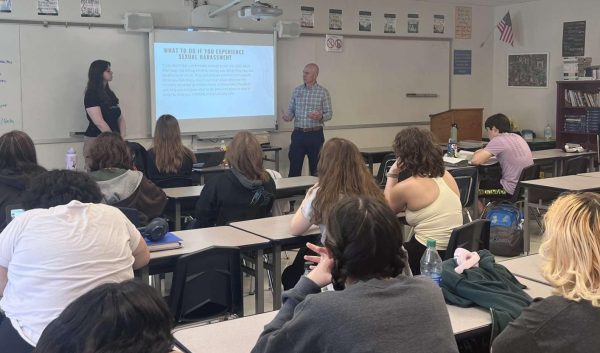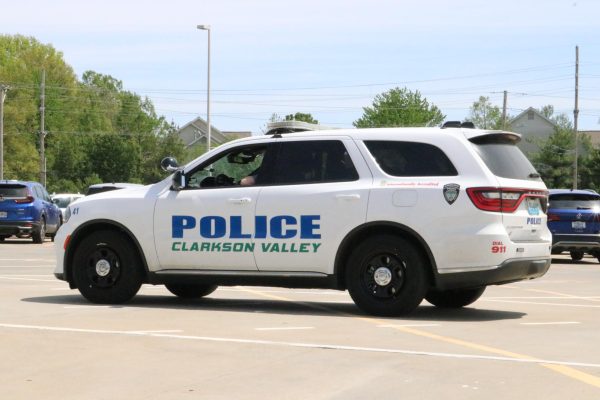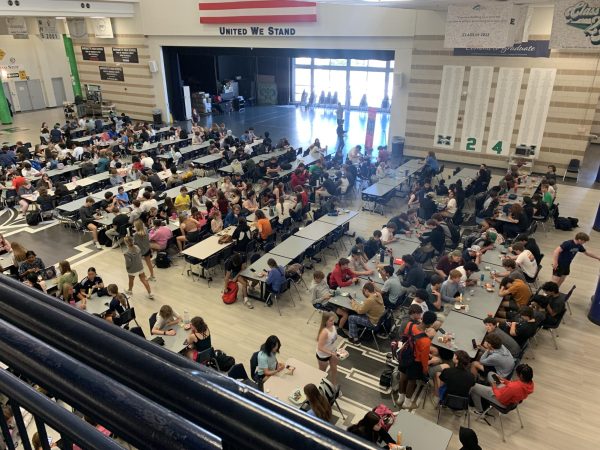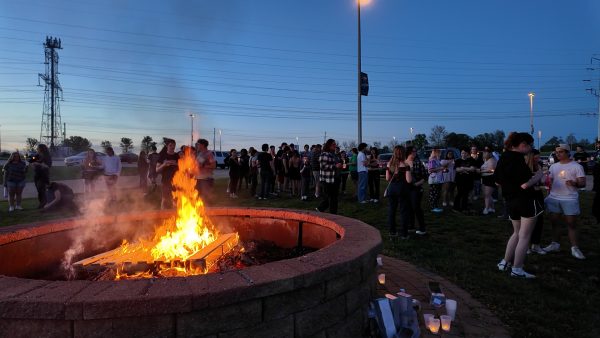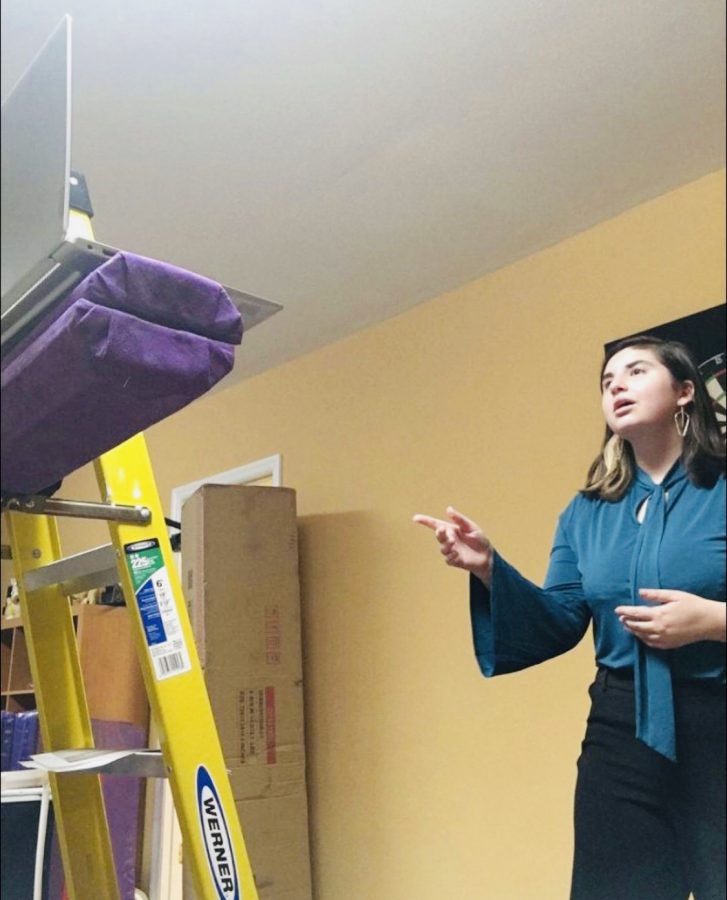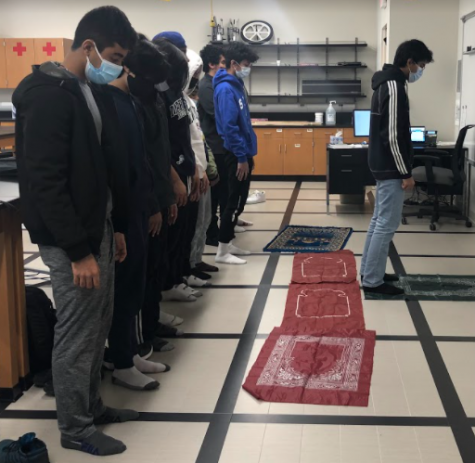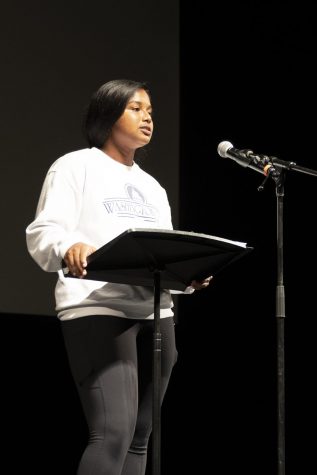Speech and Debate’s Success in Adapting to the Virtual Format
Media by Katelyn Siegel
Katelyn Siegel, sophomore, shows her set up for the Parkway West virtual competition. She props up her computer using a ladder in order to achieve the necessary height needed to keep her upper body in the frame.
While many activities have been put on hold this year, Speech and Debate has attended more competitions than usual through the virtual platform.
Head Coach Cate Sanazaro said that normally they only have 9 to 11 tournaments per session, but they have already completed 17 this year.
“We have far more tournament exposure this year because typically travel restricts us to a limited number of tournaments, so novices are given more practice and opportunities to improve due to the virtual setting,” Sanazaro said.
Sanazaro said the team has supported each other this year in order to be successful with the new virtual format. There is a larger number of members attending meetings because it is more convenient for many to join the Zoom than to attend in-person meetings.
However, the environment of live debates and speeches, Sanazro said, is something left out this season as well as the comradery that comes along with joining this club for freshmen.
Sanazaro said that the virtual format includes having meetings through Zoom and putting members into breakout rooms based on their event.
Debate is all about learning and I am excited to continue to improve with the guidance of captains who have already made novices feel like family.
— Ronith Gouni, freshman
“There is a lack of aggressiveness and healthy competition that many newbies especially are missing out on, but captains are doing a great job preparing novices to perform well,” Sanzaro said.
Karim Elbeshbeshy, sophomore, is a captain for Congress debate and has been helping guide freshmen through their first unusual year of Speech and Debate.
Elbeshbeshy said as a captain, he is doing his best to give advice and pointers to the freshman for events which may seem daunting.
“We try to keep an open line of communication to help novices and continue to teach them the ropes of debate,” Elbeshbeshy said.
Elbeshbeshy said he misses developing social bonds with others and said there has been a dramatic shift in the current speech and debate session compared to his last.
“The muting and unmuting is challenging and the inability to whisper to your partner to inform them of something is also another difficulty,” Elbeshbeshy said.
For novice Ronith Gouni, freshman, this session has not seemed out of the ordinary as he has nothing to compare it to.
The virtual lens has definitely not stopped speech and debaters especially those who are committed.
— Sarah George, senior
Gouni said speech captains are making the most of the online situation and are catering to each novice’s needs wherever guidance is needed and the additional practice is also beneficial.
“Each competition I go to I always make changes to my debate cases and speeches and having more competitions is going to make me more prepared for next year,” Gouni said.
Gouni said he is looking forward to speech and debate returning to normal and can’t wait to teach new novices based on his experience this year.
“Debate is all about learning and I am excited to continue to improve with the guidance of captains who have already made novices feel like family,” Gouni said.
Senior Sarah George, president of Speech and Debate, is undergoing her last year as a part of this club.
George said she feels like she missed out on the full experience of face-to-face debates and key opportunities such as going to Nationals, but the group has done well in adapting to the changes of this school year.
“The virtual lens has definitely not stopped speech and debaters especially those who are committed,” George said.
Your donation will support the student journalists of Marquette High School. Your contribution will allow us to purchase equipment and cover our annual website hosting costs. You may become a PATRON by making a donation at one of these levels: White/$30, Green/$50, Blue/$100. Patron names will be published in the print newsmagazine, on the website and once per quarter on our social media accounts.
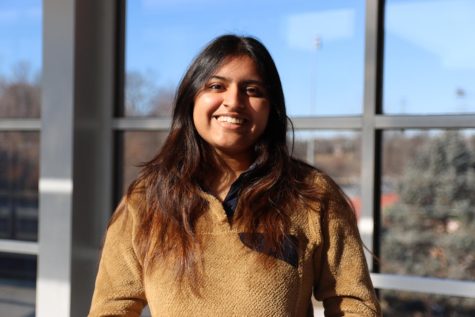
Lajja Patel (she/her), senior, is the features editor for the Marquette Messenger. This will be her second year on staff. Lajja also is part of the Key...



